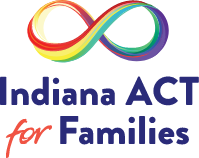“You’re Our Last Hope” Says Autism Coalition to Gov. Holcomb in Radio Ad Asking to Stop the Proposed Medicaid Cuts to Autism Care
Today, the Indiana ACT for Families coalition launched a statewide “[You’re Our Last Hope]” radio ad campaign urging Governor Holcomb to reconsider the drastic cuts his administration has proposed for Medicaid reimbursement rates for Applied Behavior Analysis (ABA) therapy.
The ad features Kate Miller, founder of the Ausome Indy nonprofit and a mother of two boys, one with autism. Miller says denying access to ABA therapy as a result of the cuts and center closures would “crush our family” calling Governor Holcomb our “only hope to stop these devastating Medicaid cuts.”
The ad campaign coincides with a reported meeting taking place today with the Family and Social Services Administration (FSSA) at the request of leading Indiana legislators, including State Rep. Becky Cash and State Rep. Robb Greene, among others “to see if we can negotiate something better” according to Rep. Cash.
Earlier this week Rep. Craig Haggard told FOX59 as the father of a son with autism who received ABA therapy that he “would hate for families to be put in the position of having to choose, do I need to put food on the table or take care of our kids as far as this type of therapy.”
Support for Hoosier families is growing across the state. Families and providers hope that the Governor will heed pleas from families and legislators and step in to stop severe cuts to ABA therapy. “Governor Holcomb is our last hope for stopping cuts, saving my family, and protecting access to the services my child relies on,” said Angie Schlueter, a mom who runs the autism non-profit All Along the Spectrum.
Holcomb Administration Proposal: Separating Fact from Fiction
- Costs: FOX59 recently highlighted FSSA’s position that in 2022 Medicaid ABA therapy expenses were $420 million and “over the last 3 years, ABA expenses increased by more than 50% each year.” There is no denying that Medicaid reimbursement costs – which are largely borne by the Federal government, not the state – have increased over time, but this fails to address the clear and obvious impact of the FSSA’s proposal: Centers will close and reduced access to ABA therapy for Hoosier children, the most vulnerable population, will become a grim reality. In truth, the growth in Medicaid spend can largely be attributed to an increase in the prevalence of autism among the general population, growth in access to diagnosis options, and an increase in the number of children receiving services, – largely because they have greater access to center based care – all of which are positives for Indiana and children with autism (per CDC about 1 in 36 children had been diagnosed with autism by age 8 in 2020 which is up from 1 in 44 children in 2018).
- Closures: It is not accurate and incongruent with providers’ own reports to assert that there will not be closures and other reductions in access to care. Providers have been clear that the significant rate cuts threaten their ability to provide services to families on Medicaid. These fears are not unfounded – providers have shut down in states like Colorado and Oregon due to Medicaid reimbursement rates that weren’t financially sustainable.
- Support for a Fixed Rate and “Standards”: Providers, including coalition members, have stated in clear, unambiguous terms support for a fixed uniform rate fee schedule across all providers, which would address Medicaid spending and budget concerns without threatening families’ access to autism services. Unfortunately, providers’ support for a fixed rate appears to be ignored by officials who favor more extreme cuts. Governor Holcomb, during a recent interview with WTHR spoke about how his administration’s proposal will bring about “standards,” which are “long overdue.” These comments are similar to canned responses being sent to parents by legislators that state the “perception of “cuts” to the reimbursement rates for ABA therapy…” is really only about “working to standardize and establish consistent reimbursement rates for ABA services.” However, the fact is that FSSA’s proposed reimbursement rate for ABA therapy is nearly 50% lower than the current average reimbursement for the most common form of ABA therapy and significantly below provider costs to deliver therapy. There is no way around the truth: This is not standardization; this is a significant cut to autism services.
###


